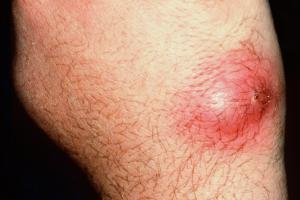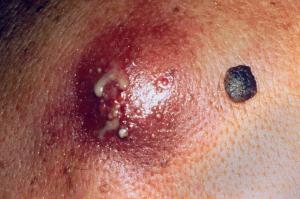Boils and carbuncles
Boils and carbuncles are red, painful lumps that form just under the surface of the skin. They are usually caused by a bacterial infection.
Boils
Boils can develop anywhere on your skin. But you're most likely to get a boil in an area where there's a combination of hair, sweat and friction, such as the face, neck, armpits or thighs.

Over time, pus forms inside the boil, making it bigger and more painful. Most boils eventually burst. The pus then drains away without leaving a scar. This can take from two days to three weeks to happen.
It can sometimes be difficult to tell the difference between a boil and a spot. But boils tend to grow bigger and become more painful. Your GP should be able to diagnose a boil from its appearance.
Carbuncles
A carbuncle is a dome-shaped cluster of boils. It usually develops over a few days. The areas most commonly affected are the back, thighs, or back of the neck.

A carbuncle can grow to a size of 3-10cm and will leak pus from a number of points.
You may also:
- have a high temperature of 38C (100.4F) or above
- feel generally unwell
- feel weak and exhausted
Carbuncles are less common than boils. They tend to mostly affect middle-aged or older men in poor health or with a weakened immune system. Boils are common in adolescents and young adults.
When to see your GP
See your GP if you think you have a carbuncle.
With boils, you don't usually need to see a doctor as most boils burst and heal by themselves. But see your GP if you have a boil:
- on your face, nose or spine – this can sometimes cause serious complications
- that gets bigger and feels soft and spongy to touch – it may not burst and heal by itself
- that doesn't heal within two weeks
- and you have a temperature and feel generally unwell
Your GP should be able to identify a boil or carbuncle by looking at it.
Treating boils and carbuncles
Self care
Most boils get better without the need for medical treatment.
One of the best ways to speed up healing is to apply a warm, moist face cloth to the boil for 10-20 minutes, three or four times a day.
Be careful not to use water that's too hot. Make sure the face cloth is not too warm to avoid a scald or burn. Test how warm it is using the skin on the back of your hand.
The heat increases the amount of blood circulating around the boil. This sends more infection-fighting white blood cells to the area.
When the boil bursts, cover it with sterile gauze or a dressing. This is to prevent the spread of infection.
Afterwards, wash your hands thoroughly using hot water and soap.
Never squeeze or pierce a boil because it could spread the infection.
You can use over-the-counter painkillers, such as paracetamol or ibuprofen, to help relieve any pain caused by the boil.
Draining boils
If your boil doesn't heal, your GP may decide to drain it, or refer you to hospital to have this done. They'll usually numb the area first and then use a sterile needle or scalpel to pierce the boil.
Antibiotics
Antibiotics are usually recommended:
- for all cases of carbuncles
- if you have a high temperature
- if you develop a secondary infection, such as cellulitis (infection of the deeper layers of the skin)
- if you have a boil on your face – facial boils have a higher risk of causing complications
- if you're in severe pain and discomfort
It's very important to finish the course of antibiotics even if the boil goes away. If you don't the infection could return.
Treating recurrent boils and carbuncles
You're likely to need further treatment if you keep getting boils or carbuncles.
Most people who keep getting boils are carriers of Staphylococcus aureus (staph bacteria). This means they have staph bacteria living on their skin or inside their nose.
Treatment will depend on where the bacteria are found on your body. Your GP will advise you about treatment.
Causes of boils and carbuncles
Boils and carbuncles are often caused by a type of bacteria called Staphylococcus aureus (staph bacteria) that infects one or more hair follicles.
You can get a boil when bacteria enter the skin through cuts and grazes.
A carbuncle develops when the infection spreads further beneath the skin to create a cluster of boils.
Complications of boils and carbuncles
Although most boils and carbuncles don't cause further problems, some people develop a secondary infection.
This can range from a minor (though often very painful) infection of the deeper layer of the skin, such as cellulitis, to rarer and more serious complications, such as sepsis.
Larger boils and carbuncles can also lead to scarring.
Preventing boils and carbuncles
You can't always avoid getting a boil or carbuncle, but these simple steps can reduce your risk:
- wash your skin regularly using a mild antibacterial soap
- carefully clean any cuts, wounds or grazes (even small ones)
- cover cuts, wounds and grazes with a sterile bandage until they heal
- eat healthily and exercise regularly to boost your immune system
Catching boils or carbuncles
You can catch a boil or carbuncle. Unlike acne, boils and carbuncles can spread to another part of the body or to another person.
To prevent boils and carbuncles spreading, take simple precautions such as:
- washing your hands after touching affected areas
- using a separate face cloth and towel
- washing underwear, bed linen and towels at a high temperature
- covering wounds with a dressing until they heal
- carefully disposing of used dressings
More useful links
The information on this page has been adapted from original content from the NHS website.
For further information see terms and conditions.